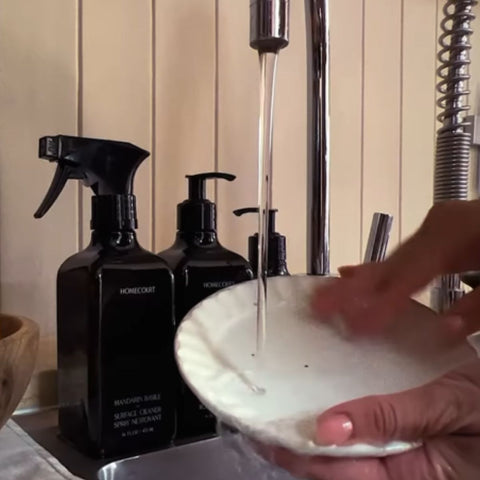Top Ingredients to Look for in Eco-Friendly Dish Soaps
Written by Jazmine Roxas — September 27, 2023

In recent times, a growing wave of environmental consciousness has caught our attention. Especially when it comes to household products, this awareness is more significant than ever. One such product is our dish soap. While we focus on the dishes, the environment suffers silently. This guide will provide you with the benefits of choosing the best sustainable dish soap. By the end, you'll be more than equipped to make an environmentally-conscious decision the next time you're in the cleaning aisle.
The Environmental Cost of Traditional Dish Soaps
Unsustainable Chemistry
Typically, traditional dish soaps contain phosphates and surfactants that are harmful to aquatic life. These chemicals may clean your dishes effectively but they wreak havoc on our waterways. Imagine how these toxic substances can affect delicate ecosystems when drained into rivers and oceans.
Plastic Packaging Woes
Another overlooked aspect of traditional dish soap is the plastic bottle it often comes in. These plastic bottles often end up in landfills or our oceans, contributing to a larger problem of plastic pollution. Sustainability is not just about the liquid inside but also the packaging it comes in.
Water Pollution and Energy Usage
Water treatment plants have to work extra hard to clean the water contaminated by traditional dish soap. This process consumes significant amounts of energy and still may not remove all harmful substances. This can lead to longer-term issues like water pollution.
Plant-Derived Surfactants
What Are Surfactants?
Surfactants are substances that play a crucial role in cleaning. They're the agents responsible for creating bubbles or lather when you scrub your dishes, hands, or anything else that needs cleaning. When you squeeze dish soap onto a sponge and start scrubbing, it's the surfactants that go to work. They cling to the grease and grime on your dirty dishes, lifting them away and making it easier to rinse off. In eco-friendly dish soaps, these surfactants are often derived from plants, which makes them a better option for the environment compared to traditional surfactants, which are usually synthetic.
Plant-Based Vs. Petroleum-Based
When it comes to surfactants, there are mainly two types: plant-based and petroleum-based. Plant-derived surfactants, as the name suggests, are extracted from natural sources such as coconut or palm oil. These sources are renewable, as the plants can be regrown, making these surfactants more sustainable and environmentally friendly. Such attributes are particularly appealing in an era where consumers and industries are increasingly conscious of ecological impacts.
On the other hand, petroleum-based surfactants are synthesized from petrochemicals, which are derived from crude oil. The extraction and refining processes involved in obtaining these petrochemicals are energy-intensive and contribute significantly to environmental pollution, including greenhouse gas emissions. Moreover, crude oil is a non-renewable resource, which raises concerns about long-term sustainability. Despite these drawbacks, petroleum-based surfactants are often favored in various industrial applications due to their cost-effectiveness and efficiency in complex formulations where extreme conditions or specific performance criteria must be met.
Effectiveness in Cleaning
You might wonder if plant-based surfactants can be as effective as their chemical counterparts. Good news: they are. These natural surfactants break down grime and grease just as well, if not better, making them the best biodegradable dish soap option.
The Gentle Power of Glycerin
Glycerin Defined
Glycerin is a common ingredient you'll find in the most natural dish soap formulas, especially those that are labeled as natural or eco-friendly. It's a natural humectant, which means it can attract and hold onto water molecules. This makes it an excellent ingredient for cleaning products because it helps to keep them moist and easy to spread. In dish soap, glycerin works alongside surfactants to make sure that not only are your dishes clean, but the soap is also easy to handle and effective in its job.
Gentle on Hands
While you may look for the best kitchen surface cleaner, don't forget the soap's impact on your hands. Glycerin acts as the best natural hand moisturizer, ensuring that your hands don’t dry out after doing the dishes. Unlike some harsh chemical ingredients that can leave your skin feeling dry and irritated, glycerin ensures that your hands remain moisturized and comfortable, even after you've spent a long time scrubbing away at a sink full of dishes.
Biodegradable Nature
On top of its moisturizing benefits, glycerin is biodegradable. This means it breaks down naturally without causing environmental harm, enhancing its reputation as a key ingredient in eco dish soap.
Other Key Ingredients for a Green Clean
Essential Oils
These oils are increasingly popular in household products for their natural origins and multifaceted benefits. Extracted from various parts of plants, such as flowers, leaves, and bark, through methods like steam distillation or cold pressing, these oils retain the powerful properties of the plants from which they are derived. When incorporated into plant-based dish soaps, essential oils contribute significantly to both the experience and effectiveness of daily cleaning tasks:
- Aroma: Essential oils are renowned for their diverse and invigorating scents, which they bring to household cleaning products. Unlike synthetic fragrances that can be overpowering and contain potentially harmful chemicals, essential oils offer a more subtle and natural olfactory experience. The pleasant aroma of essential oils like lemon, peppermint, or rosemary can transform the mundane task of dishwashing into a more enjoyable and sensory activity. These natural fragrances can also influence mood, with certain scents promoting relaxation or invigoration during use, making them a superior choice for enhancing the ambiance of a home.
- Antimicrobial Properties: Essential oils are not just about pleasant scents; they possess powerful antimicrobial properties that make them excellent additives in dish soaps. Oils such as tea tree, oregano, and thyme are particularly effective against a wide range of bacteria, fungi, and viruses. When used in dish soaps, these oils help to sanitize and clean kitchenware effectively without the use of harsh chemicals. This natural antibacterial and antiviral activity supports a healthier kitchen environment by reducing the spread of pathogens, therefore enhancing the cleaning power of soaps through a mechanism that is both effective and environmentally friendly.
- Popular Choices: Among the array of essential oils available, lavender, eucalyptus, and tea tree oils stand out for their unique qualities in dish soaps. Lavender oil is appreciated for its soothing scent and stress-relieving properties, making the task of dishwashing more relaxing. Eucalyptus oil offers a sharp, clean aroma that also acts as a natural deodorizer, effectively neutralizing kitchen odors. Tea tree oil is prized for its robust antimicrobial properties, which make it highly effective in combating kitchen germs. Each of these oils adds not only a distinctive fragrance but also enhances the hygienic qualities of the dish soap.
- Safer Ingredients: Opting for essential oils in dish soaps instead of synthetic fragrances can lead to a healthier cleaning experience. Many synthetic fragrances contain allergens and volatile organic compounds (VOCs) that can cause respiratory irritation, allergic reactions, and other health issues. Essential oils, being natural extracts, are generally free from these harmful chemicals. By integrating essential oils into dish soap formulations, manufacturers can offer products that are safer for both the environment and the consumer. This approach aligns with growing consumer demand for products that are not only effective but also gentle and safe for regular use.
By integrating essential oils into your cleaning routine through plant-based dish soaps, you not only enhance the effectiveness of your household cleaning but also contribute to a healthier, more aromatic, and enjoyable environment. This smart integration of nature's best into everyday products highlights a move towards more sustainable and health-conscious living.
pH Balancers
pH balancers like citric acid play a pivotal role in the formulation of the best eco dish soap options. These natural acids help regulate the pH level of the soap, ensuring it remains effective yet gentle on the skin and the environment. A balanced pH is crucial not only for maintaining the cleaning efficacy of the soap but also for its stability, preventing it from becoming too acidic or too alkaline. Citric acid, derived from citrus fruits, is a common choice due to its natural origin and biodegradable nature. By maintaining a neutral pH, these balancers make the soap safe for everyday use while also protecting aquatic life once the soap residue washes down the drain. Furthermore, a well-balanced dish soap helps preserve the integrity of the materials being cleaned, preventing damage to delicate glassware or glazed ceramics, thus combining effectiveness with environmental responsibility.
Preservatives and Thickeners
Natural preservatives such as vitamin E, rosemary extract, and grapefruit seed extract help prevent the growth of mold and bacteria, thereby extending the shelf life of the soap without introducing harmful chemicals into the environment. Thickeners like xanthan gum or guar gum, derived from natural sources, are used to achieve the desired consistency of the soap, making it easier to apply and increasing its efficacy in cleaning. These natural thickeners and preservatives are not only safer for the environment but also for human health, avoiding the risks associated with their synthetic counterparts. By choosing dish soaps that incorporate natural preservatives and thickeners, consumers can enjoy a product that is both effective in cleaning and supportive of a sustainable lifestyle.
The Bigger Picture: Personal and Planetary Wellbeing
Impact on Personal Health
Choosing an eco-friendly dish soap isn't just about saving the planet; it's also about personal health. These soaps tend to be free of harmful chemicals, making them safer for skin contact. They often contain natural moisturizers like glycerin, which doubles as an eco-friendly hand cream.
Contributing to a Greener Planet
Opting for a sustainable dish soap contributes to larger global initiatives aimed at reducing environmental degradation. Your choice might seem small, but it's a valuable step toward a sustainable future.
Deciphering Product Labels: Your Guide to Conscious Choices
To achieve a truly eco-conscious kitchen, it's essential to go beyond the basics and dive into the intricacies of product labels. Understanding these labels is more than just a minor detail; it is the culmination of your efforts to ensure every aspect of your kitchen promotes sustainability. This final step is pivotal as it helps you navigate through misleading marketing tactics, often referred to as "greenwashing," where products are falsely portrayed as environmentally friendly. Here's how to master this crucial skill:
- What to Look For - When scanning product labels in your quest for an eco-friendly kitchen, certain certifications stand out as indicators of genuine sustainability. For instance, labels like "Cruelty-Free" signify that no animal testing was conducted, which reflects ethical manufacturing practices. Similarly, the "Biodegradable" label means the product will break down naturally in the environment without causing harm. These markers are essential in selecting the best eco-friendly dish soaps that align with your values of minimizing environmental impact. Understanding these certifications can significantly simplify your shopping process, ensuring that you're not just buying a product, but investing in a sustainable practice.
- What to Avoid - Equally important is knowing which ingredients and labels to steer clear of. Products containing phosphates, artificial fragrances, or petrochemical derivatives should be avoided as they can be harmful to the environment and, in some cases, to your health. Phosphates, for instance, can lead to algal blooms in water bodies, severely affecting aquatic life. Artificial fragrances may contain chemicals that can trigger allergies and other health issues, while petrochemical derivatives, sourced from non-renewable fossil fuels, are unsustainable. By avoiding these ingredients, you are not only choosing safer products but are also actively contributing to reducing harmful environmental impacts.
- Questions to Ask - Before finalizing your purchase of dish soap, take a moment to consider a few critical questions to further ensure the eco-friendliness of the product. Check if the packaging is recyclable or made from recycled materials. This reduces waste and supports the recycling industry. Additionally, inquire whether the ingredients are sustainably sourced and if the manufacturer practices responsible waste management during production. These questions will help you better understand the overall environmental footprint of the product, ensuring that your choice is as green as possible. Being critical and curious makes you a more aware consumer, which is crucial in the struggle against environmental degradation.
Becoming proficient in reading and understanding product labels is an essential skill for anyone looking to support sustainable practices through their consumer choices. By focusing on what to look for, what to avoid, and which questions to ask, you can make more informed decisions that align with your commitment to an eco-friendly lifestyle. This proactive approach in the kitchen not only benefits the environment but also sets a standard for responsible consumption.
Understanding and prioritizing the top ingredients in your dish soap is a small yet significant step towards personal and planetary well-being. In selecting the best sustainable dish soap, you are not just ensuring clean dishes but also contributing to a cleaner and healthier planet. Let’s embrace this awareness and make informed, responsible choices for a more sustainable tomorrow.


